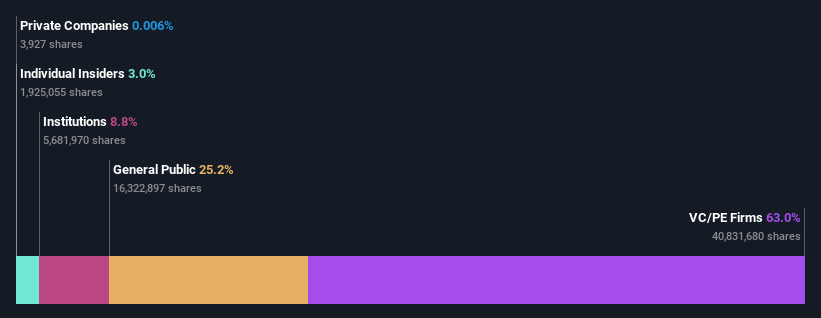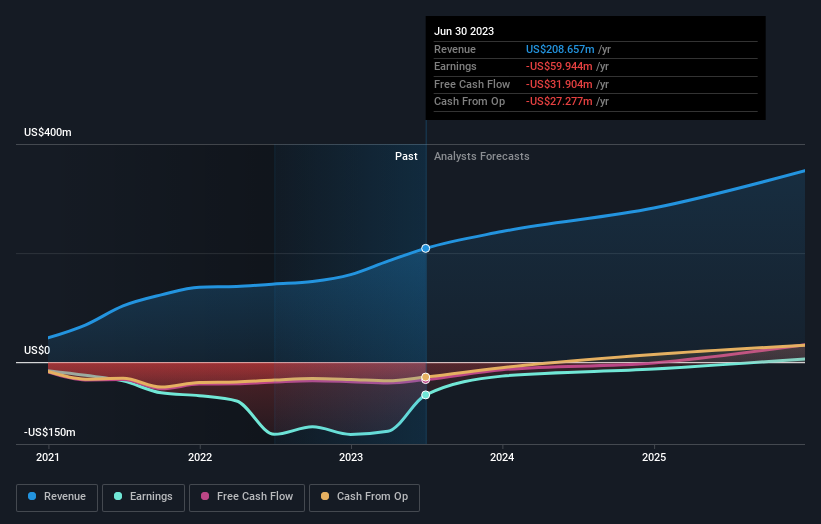- United States
- /
- Aerospace & Defense
- /
- NYSE:RDW
Private equity firms are Redwire Corporation's (NYSE:RDW) biggest owners and were hit after market cap dropped US$22m

Key Insights
- The considerable ownership by private equity firms in Redwire indicates that they collectively have a greater say in management and business strategy
- 56% of the company is held by a single shareholder (AE Industrial Partners, LP)
- Using data from analyst forecasts alongside ownership research, one can better assess the future performance of a company
Every investor in Redwire Corporation (NYSE:RDW) should be aware of the most powerful shareholder groups. With 63% stake, private equity firms possess the maximum shares in the company. That is, the group stands to benefit the most if the stock rises (or lose the most if there is a downturn).
And last week, private equity firms endured the biggest losses as the stock fell by 10%.
In the chart below, we zoom in on the different ownership groups of Redwire.
View our latest analysis for Redwire

What Does The Institutional Ownership Tell Us About Redwire?
Institutions typically measure themselves against a benchmark when reporting to their own investors, so they often become more enthusiastic about a stock once it's included in a major index. We would expect most companies to have some institutions on the register, especially if they are growing.
As you can see, institutional investors have a fair amount of stake in Redwire. This implies the analysts working for those institutions have looked at the stock and they like it. But just like anyone else, they could be wrong. When multiple institutions own a stock, there's always a risk that they are in a 'crowded trade'. When such a trade goes wrong, multiple parties may compete to sell stock fast. This risk is higher in a company without a history of growth. You can see Redwire's historic earnings and revenue below, but keep in mind there's always more to the story.

We note that hedge funds don't have a meaningful investment in Redwire. Looking at our data, we can see that the largest shareholder is AE Industrial Partners, LP with 56% of shares outstanding. This essentially means that they have extensive influence, if not outright control, over the future of the corporation. Genesis Park LP is the second largest shareholder owning 7.3% of common stock, and The Vanguard Group, Inc. holds about 1.4% of the company stock.
Researching institutional ownership is a good way to gauge and filter a stock's expected performance. The same can be achieved by studying analyst sentiments. There are plenty of analysts covering the stock, so it might be worth seeing what they are forecasting, too.
Insider Ownership Of Redwire
The definition of company insiders can be subjective and does vary between jurisdictions. Our data reflects individual insiders, capturing board members at the very least. The company management answer to the board and the latter should represent the interests of shareholders. Notably, sometimes top-level managers are on the board themselves.
Insider ownership is positive when it signals leadership are thinking like the true owners of the company. However, high insider ownership can also give immense power to a small group within the company. This can be negative in some circumstances.
We can report that insiders do own shares in Redwire Corporation. In their own names, insiders own US$5.7m worth of stock in the US$192m company. This shows at least some alignment, but we usually like to see larger insider holdings. You can click here to see if those insiders have been buying or selling.
General Public Ownership
The general public, who are usually individual investors, hold a 25% stake in Redwire. This size of ownership, while considerable, may not be enough to change company policy if the decision is not in sync with other large shareholders.
Private Equity Ownership
With an ownership of 63%, private equity firms are in a position to play a role in shaping corporate strategy with a focus on value creation. Some might like this, because private equity are sometimes activists who hold management accountable. But other times, private equity is selling out, having taking the company public.
Next Steps:
While it is well worth considering the different groups that own a company, there are other factors that are even more important. To that end, you should be aware of the 4 warning signs we've spotted with Redwire .
Ultimately the future is most important. You can access this free report on analyst forecasts for the company.
NB: Figures in this article are calculated using data from the last twelve months, which refer to the 12-month period ending on the last date of the month the financial statement is dated. This may not be consistent with full year annual report figures.
New: AI Stock Screener & Alerts
Our new AI Stock Screener scans the market every day to uncover opportunities.
• Dividend Powerhouses (3%+ Yield)
• Undervalued Small Caps with Insider Buying
• High growth Tech and AI Companies
Or build your own from over 50 metrics.
Have feedback on this article? Concerned about the content? Get in touch with us directly. Alternatively, email editorial-team (at) simplywallst.com.
This article by Simply Wall St is general in nature. We provide commentary based on historical data and analyst forecasts only using an unbiased methodology and our articles are not intended to be financial advice. It does not constitute a recommendation to buy or sell any stock, and does not take account of your objectives, or your financial situation. We aim to bring you long-term focused analysis driven by fundamental data. Note that our analysis may not factor in the latest price-sensitive company announcements or qualitative material. Simply Wall St has no position in any stocks mentioned.
About NYSE:RDW
Redwire
Provides critical space solutions and space infrastructure for government and commercial customers in the United States, Europe, and internationally.
High growth potential with mediocre balance sheet.
Similar Companies
Market Insights
Community Narratives




